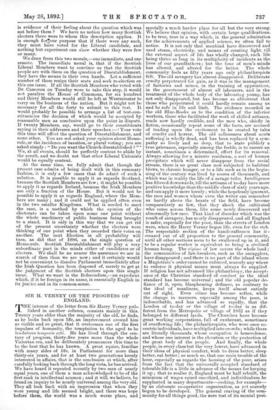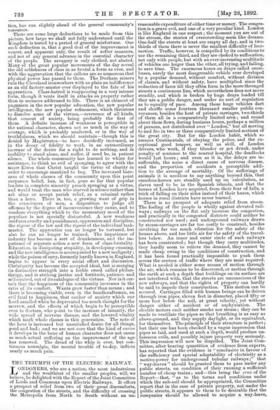SIR H. VERNEY ON THE PROGRESS OF ENGLAND. T HE interest
of the letter from Sir Harry Verney pub- lished in another column, consists mainly in this. Twenty years older than the majority of the old, he finds, as he looks back upon life, an improvement around him so visible and so great, that it overcomes one of the first impulses of humanity, the temptation to the aged to be laudatores temporis acti. He has lived through the cen- tury of progress, thirty-five years more than the whole Victorian era, and he deliberately pronounces this time to be the best that he has known. A great squire, familiar with many sides of life, in Parliament for more than thirty-six years, and for at least two generations keenly interested in affairs, that is the conclusion at which, after carefully looking back through the long vista, he has arrived. We have heard it repeated recently by two men of nearly equal years, one of them a man acknowledged to be of the first rank in intellectual acumen ; and it will, we believe, be found on inquiry to be nearly universal among the very old. They all look back with an impression that when they were young and life seemed bright, and there was hope before them, the world was a much worse place, and specially a much harder place for all but the very strong. We believe that opinion, with certain large qualifications, to be true, true in a way which, in the general admiration for the achievements of applied science, we often fail to notice. It is not only that mankind have discovered and used steam, electricity, and means of creating light, till the external aspect of life has wholly changed, each life being thrice as long in its multiplicity of incidents as the lives of our grandfathers ; but the tone of men's minds has altered, and altered for the better. The whole community feels as fifty years ago only philanthropists felt. The old savagery has almost disappeared. Deliberate cruelty perpetrated for gain, as it was in the management of factories and mines, in the training of apprentices, in the government of almost all labourers, and in the treatment of the whole body of the labouriug young, has not only disappeared, but has become so abhorrent that those who perpetrated it _could hardly remain among us and be safe in life and limb. The evidence recorded in the old Blue-Books as to the condition of the inferior workers, those who facilitated the work of skilled artisans, reads now hardly credible, and the men who, chiefly in fiction, occasionally repeat some of the facts, are accused of trading upon the excitement to be created by tales of cruelty and horror. The old callousness about acute suffering is wholly dead, and has been replaced by a sym- pathy so lively and so deep, that to state publicly a true grievance, especially among the feeble, is to ensure an instant, sometimes a determined, effort for its removal. Always allowing for a minute residuum, a sort of human precipitate which will never disappear from the social stream, there is no great class now subjected to habitual blows, to chronic hunger, or to a life such as in the begin- ning of the century was lived by scores of thousands, and which was in reality the life of a savage tribe. Intelligence has filtered downwards, till the artisans of to-day have more positive knowledge than the middle class of sixty years ago, and can apply it more keenly ; while the hopelessly ignorant, the men and women whom even the writer can remember as hardly above the beasts of the field, have become comparatively so few, that they shock the cultivated 1 who come across them, like some newly discovered and abnormally low race. That kind of disorder which was the result of savagery, has nearly disappeared, and all England is safer, especially for the poor, than the streets of London were, when Sir Harry Verney began life, even for the rich. The respectable section of the handicraftsmen has it- creased out of all proportion to the general community, until all other sections seem to be swallowed up in it, and to be a regular worker is equivalent to being a civilised human being. The regime of law covers the whole land ; the communities of law-breakers, such as the smugglers, have disappeared ; and there is no part of the island where a Magistrate's order cannot be enforced, scarcely any where to enforce it physical means must always be supplied. If religion has not advanced like philanthropy, the accept- ance of the Christian standard of conduct as the ideal standard has become universal ; and the old popular de- fiance of it, open, blaspheming defiance, as contrary to the ideal of manliness, keeps itself almost entirely out of sight. Even crime has become softer, while the change in manners, especially among the poor, is indescribable, and has advanced so rapidly, that the London of to-day or the village of to-day is as dif- ferent from the Metropolis or village of 1832 as if they belonged to different lands. The Churches have become great working corporations, full of exuberant, sometimes of overflowing life ; the philanthropists, who were once ec- centric individuals, have multiplied into crowds ; while there are literally thousands whose occupation is benevolence, and whose one interest is the elevation or the protection of the great body of the people. And finally, the whole people, in every class but the very lowest, have advanced in their ideas of physical comfort, wish to dress better, sleep better, eat better ; so much so, that one main trouble of the hour, especially as regards the housing of the poor, arises from the fact that the universally accepted standard of tolerable life is a little in advance of the means for keeping it up ; that to realise it, England must be half rebuilt, the minimum of wages raised one-third, and individualism be supplanted in many departments—cooking, for example— by an elaborate co-operative organisation, as yet scarcely begun to be developed. The general craving of the com- munity for all things good, the sure test of its mental post- ton, has run slightly ahead of the general community's resources.
There are some large deductions to be made from this picture, how large we shall not fully understand until the Kingdom is tested by a period of general misfortune. One such deduction is, that a good deal of the improvement is veneer, and apparent only, the result of softer manners, and not of any general advance in the essential character of the people. The savagery is only clothed, not abated. Many of the great popular movements of the day reveal the old selfishness of class in as brutal a form as ever, and with the aggravation that the callous are so numerous that physical power has passed to them. The Durham miners ruin the Cleveland ironworkers with as plain an indifference as an old factory-master ever displayed to the fate of his apprentices. Class-hatred is reappearing in a very intense form, though it vents itself in attacks on property rather than in menaces addressed to life. There is an element of paganism in the new popular education, the new popular intelligence, the new popular refinement, which threatens to dissolve some of the virtues,—reverence of all kinds, that cement of society, beiug probably the first of them. A definite increase of weakness is perceptible in the national character, shown not so much in the way of courage, which is probably unaltered, or in the way of truthfulness, which we should maintain—though this is denied by Magistrates—to have decidedly increased, as in the decay of fidelity to work, in an extraordinary increase of the desire for a right to do nothing, and in inability to stand alone, and suffer, if need be, in patient silence. The whole community has learned to whine for assistance, to think no evil of sponging, to agree with the miser Elwes that Christ taught the virtue of charity in order to encourage mankind to beg. The increased base- ness of whole classes of the community upon this point surpasses belief, has, in fact, gone so far that popular leaders in complete sincerity preach sponging as a virtue, and would treat the man who starved in silence rather than ask alms or accept parish relief, as a criminal rather than a hero. There is, too, a growing want of grip in the consciences of men, a disposition to judge all offences by the degree of inconvenience they cause, and to condone everything which to the momentary mood of the populace is not specially distasteful. A new weakness confuses cruelty and punishment, oppression and discipline, the rigour of the law and the rigour of the individual task- master. The apprentice can no longer be tortured, but also he can no longer be trained. The impatience of industry has become a sort of drunkenness, and the im- patience of separate action a new form of class-brutality. Education, in dissipating stupidity, is developing cunning, and the new intelligence is accompanied by a new malignity ; while the poison of envy, formerly hardly known in England, begins to appear in every social effort and discussion. Christianity has become the accepted ideal, but is merging its distinctive strength into a feeble creed called philan- thropy, and is striking justice and fortitude, patience and self-control, out of its catalogue of the virtues. Nor is it cer- tain that the happiness of the community increases in the ratio of its comfort. Wants grow faster than means ; and there is becoming visible, even in the handicraftsman, an evil fatal to happiness, that canker of anxiety which our Lord assailed when he deprecated too much thought for the morrow, and the effects of which begin to be perceptible even to doctors, who point to the increase of insanity, the wide spread of nervous disease, and the lowered vitality which mark whole classes in this generation. The note of the hour is increased but unsatisfied desire for all things, good and bad ; and we are not sure that the kind of carie8 it develops in the bone of human character does not cause as much actual suffering as the improvement of the age has removed. The dread of the whip is over, but con- tinuous neuralgia, the mental trouble of to-day, inflicts nearly as much pain.







































 Previous page
Previous page